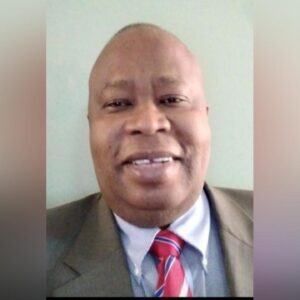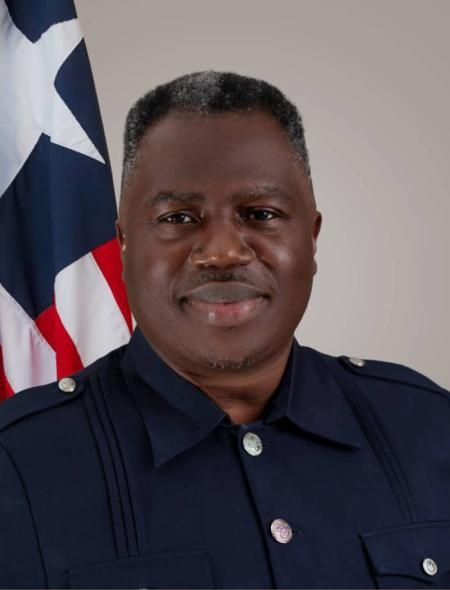PHOTO: Liberia’s Vice President Koung
By Austin S Fallah-A Believer in Peace and National Security
In assessing the dynamics of political structure and the distribution of executive power, particularly in the context of developing democracies such as Liberia, a critical yet often understated consideration is the utilization of the Vice Presidential office to its fullest potential.

The Author’s photo
This discourse aims to analyze the crucial need for the office of Vice President Jeremiah K.Koung, a figure noted for his assertive spirit and youthful vigor, to spearhead national security, a strategic move that could decisively address the imminent threat posed by politically motivated hooligans’ intent on undermining the nation’s stability.
The Imperative of Full Utilization of the Vice Presidential Office:
The office of the Vice President carries the inherent potential for influential governance, often overlooked in the shadows of the Presidency.
However, the current political landscape in Liberia demands a reevaluation of this customary oversight.
Given the escalating concerns relating to national security, it is essential to consider the benefits that can be accrued from an empowered Vice Presidential role specifically, its capacity to enforce law and order.
V.P. Jeremiah K.Koung, by his position, holds a unique blend of authority, youth-driven energy, and what has been colloquially termed testicular fortitude.
His vigor is representative not only of physical courage but also of unyielding determination to confront challenges head-on.
In a nation like Liberia, where the fragile state of peace and security can potentially regress into chaos, such determination becomes an indispensable asset.
The Element of Youth and Political Aspiration:
The argument for Vice President Koung’s direct involvement in the charge of national security extends beyond his official capacities and delves into intrinsic qualities associated with his youth.
His youthful status is not merely symbolic.
It embodies a connection to the aspirations and resilience of a younger demographic a demographic that is all too often the face of political activism and change, for better or worse.
Moreover, Koung’s youth implies a lingering path ahead in political terms.
The prospective longevity of his career incentivizes him to lay down an uncompromised foundation of lawfulness and order, ensuring that his future in politics is not marred by the perils of insurrection or civil unrest.
His vested interest in the long-term tranquility of the state, therefore, fortifies his potential in this role as a guardian of peace.
International Reception and Support:
In an era where international relations are marked by the push for democratic norms and human rights, there is a keen international watchfulness over countries navigating the turbulent waters of political stability.
The international community, which often acts as a sentinel of such ideals, is likely to stand firmly in support of robust legal enforcement and democratic sanctity.
A Vice President, such as Koung, proactively advocating law enforcement and safety within Liberian jurisdiction, aligns with the global vision of fostering secure states where the rule of law prevails.
The political endorsement and potential aid that may follow from the international fraternity cannot be understated in their importance, both for the credibility and the logistics of sustaining a fortified security protocol.
The Creation of an Autonomous National Security Body:
Given the ascendancy of threats to Liberia’s national security, the proposition stands that an urgent form of action must be the establishment of a national security body.
This body, however, must not merely exist as a ceremonial entity or operate as a disjointed extension of current power structures.
It requires autonomy, decisiveness, and a direct line of command under the vigilant oversight of the Vice President.
Vice President Koung, should he chair and supervise such an entity, would not only signify the gravity with which the issue is addressed but also assure less friction in decision-making and execution of the mandates of the security body.
His leadership can quell the chaos instilled by those who plague the state with acts of profound irresponsibility and wanton disregard for peace, a form of accountability vital to the environment of deterrence against future destabilization efforts.
Accountability in the Face of National Havoc:
Hooliganism, as an instrument of political expression, has a longstanding history of corroding the fabric of civil society, often manipulating social dissent and transforming it into violent unrest.
When left unchecked or inadequately combated, hooligans emboldened by their apparent impunity continue to erode national integrity.
It is in this context that the tenets of accountability and its enforcement become paramount.
By investing the power to command this accountability in the Vice Presidency, Liberia sends a clear message to all affiliates of such chaos.
Your actions will not go unnoticed or unpunished.
With Vice President Koung at the helm of this accountability exercise, fortified by his youth-enriched perspective and assertiveness, there exists the promise of a stringent response mechanism, unencumbered by bureaucratic inertia or political compromise.
The discourse herein elucidates the compelling justification for Vice President Jeremiah K.Koung to be entrusted with the significant responsibility of leading Liberia’s national security efforts.
His energetic youth, productive political ambition, and unflagging resolve emblematic of his personality stand not only as attributes that bolster his candidacy for this role but also as harbingers of hope for Liberia’s future.
Furthermore, with international support potentially galvanizing this move, the establishment of an autonomous national security body offers a sustainable and systematic approach to countering threats to stability.
It empowers Liberia to both respond to immediate concerns and to create a precedent of accountability that could dissuade future attempts at state destabilization.
Ultimately, in a transition towards lasting peace and rule of law, it is this kind of proactive leadership exemplified by figures like Vice President Koung that can solidify Liberia’s journey from a tenuous peace to a resilient and sovereign democratic state.
The objectives are clear, harness the office of the Vice President as a beacon of youthful assertiveness, align Liberia with global democratic principles, and carve a path for unshakable national security, an endeavor in which Vice President Koung could, and indeed should, play an instrumental role.

